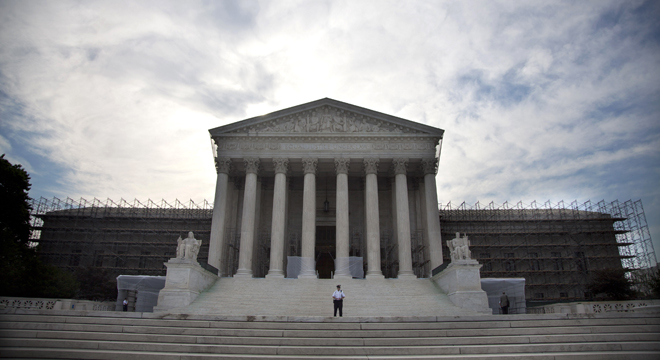WASHINGTON — Several prominent election lawyers on a panel here Friday predicted that the Supreme Court would ultimately strike down a part of the Voting Rights Act that requires states with a history of racial discrimination to have their election laws precleared by federal authorities.
Just one, Michael Carvin of Jones Day, thought that was a good thing.
“Nobody could reasonably argue that the situation in the South or anywhere else today is remotely comparable to what it was in 1965, so it’s fundamentally irrational to put a tougher standard on people though 2032 than it was in 1965,” Carvin said during the panel discussion at George Washington University Law School. Carvin claimed that other parts of the Voting Rights Act would still protect voters from discrimination even if one part was struck down.
The Supreme Court said earlier this month it would review the constitutionality of Section 5 of the act, which requires the federal government to sign off on the state laws. Assistant Attorney General Tom Perez, who heads the division of the Justice Department that enforces the VRA, argued earlier in the day that Section 5 was just as necessary as ever.
“Section 5 continues to be necessary, and Section 5 is not over inclusive,” Perez said, according to the Huffington Post. “And that is why we will continue to vigorously defend Section 5 in the Supreme Court.”
During the panel, Gilda Daniels of the University of Baltimore predicted that discriminatory election practices would have to be stopped in a “piecemeal” way if Section 5 was found unconstitutional. She predicted the process would take much longer and said the government would no longer be able to prevent discrimination before it took place. “It will often be too late,” she said.
Justin Levitt, a professor at Loyola Law School, said during the panel that a post-Section 5 world would be “deeply frightening.”
“The jurisdictions that were covered were covered because democracy was broken,” Levitt said. “Those jurisdictions that fixed it are either eligible for bailout or have decided that it’s not really burdensome. … The jurisdictions that we have left are those that have not fixed their broken democracies or those who have decided they would rather live with the preclearance regime.”






